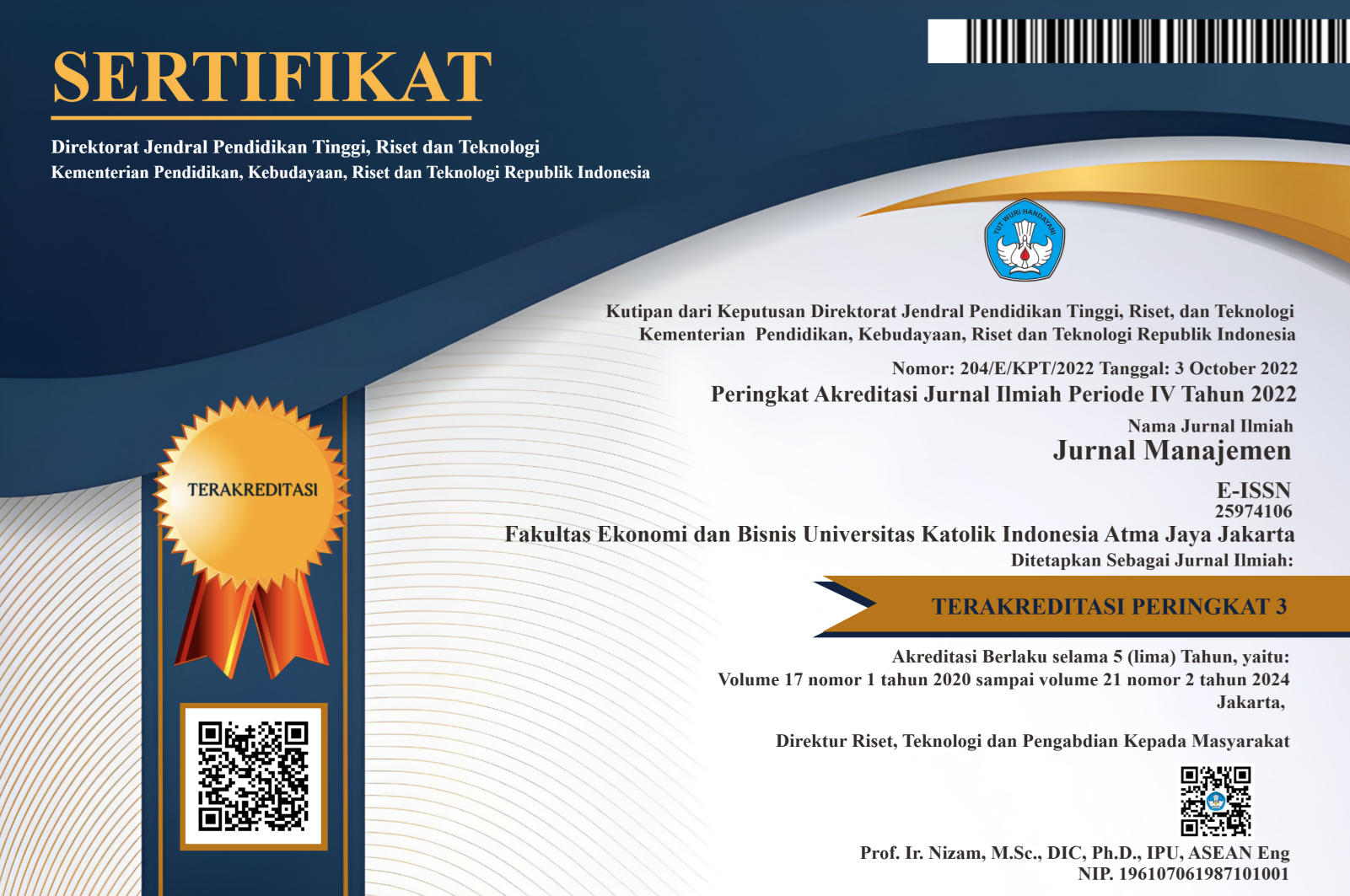Etnis Tionghoa dan Jawa : Cara Pandang Mereka dalam Mempersiapkan Suksesor Bisnis Keluarga
DOI:
https://doi.org/10.25170/jm.v16i2.1122Keywords:
Succession, Javanese, ChineseAbstract
This study aims to examine the difference attitude between Indonesian Chinese and Indonesian Javanese in term of family business successor planning.. Sample used in this researh is came from Javanese and Indonesian Chinese businessman in Semarang. Data retrieval is done by using open-ended questionnaire, and being processed by SPSS ver 19.. The results of the study show that there is a significant difference between Indonesian Javanese and Indonesian Chinese in case of the way they prepare their family business successor.
References
Bjerke, B.V. (2000). A Typified, Culture – based, Interpretation of Management of SME in Southeast Asia. Asia Pacific Journal of Management, Vol 17, pp. 103-132.
Chrismann, J. J., Chua, J.H., dan Sharma, P. (1998). Important Attributes of Successor in Family Business: an Exploratory Study. Family Business Review, Vol. 12(1), pp. 19 – 34.
Efferin, S., dan Hartono, M.S. (2015). Management Control and Leadership Style in Family Business: an Indonesian Case Study. Journal of Accounting and organizational Change, Vol. 11(1), pp. 130 – 159.
Efferin, S., dan Hopper, T. (2007). Management Control,Culture and Ethnicity in a Chinese Indonesian Company. Accounting, Organization and Society, Vol. 32, pp. 223 – 262.
Emsan. (2011). Rahasia Bisnis Orang Cina, Arab, dan India. Yogyakarta : Penerbit DIVA Press.
Ibrahim, A.B., dan Ellis, W.H. (2004). Family Business Management Concept and Practice. Duburque : Kendall / Hunt.
Lee, J., dan Li, H. (2009). Wealth Doesn’t Last 3 Generation: How Family Business can Maintain Prosperity. Singapura : Penerbit World Scientifi Pubishing.
Widyahartono, B. (1988). Kongsi dan Spekulasi Jaringan Kerja Bisnis Cina. Jakarta: Penerbit Pustaka Utama Grafiti
Rademakers, M.F.I. (1998). Market Organization in Indonesia: Javanese and Chinese Family Business in the Jamu Industry. Organization Studies, Vol. 19(6), pp. 1005 – 1027.
Setyawan, S. (2005). Konteks Budaya Etnis Tionghoa dalam Manajemen Sumber Daya Manusia. Benefit, Vol. 9(2), pp. 164 – 170.
Suryadinata, L., Arifin, E.N., dan Ananta, A. (2003). Penduduk Indonesia: Etnis dan Agama dalam Era Perubahan Politik. Jakarta : Penerbit LP3ES.
Susanto, A.B., dan Susanto, P. (2013). Dragon Network : Inside Stories of The Most Successful Chinese Family Business. Singapura : Peerbit John Wiley and Son.
Sutanto, O., dan Nurrachman, N. (2018). Makna Kewirusahaan pada Etnis Jawa, Minang, dan Tionghoa: Sebuah Studi Representasi Sosial. Jurnal Psikologi Ulayat, Vol. 5(1), pp. 86 – 108.
Sonfield, M.C., dan Lussier, R.N. (2004). First, Second and Third Generation Family Firms: A Comparison. Family Business Review, Vol. 17(3), pp. 189 – 202.
Vidyatmoko, D., dan Rosadi, A.H.Y. (2015). Faktor Utama Kesuksesan Wirausaha di Industri Pangan. Jurnal Manajemen Teknologi, Vol. 14(1), pp. 47 – 65.
Van der Merwe, S.P., Venter, E., dan Ellis, S.M. (2009). An Exploratory Study of Some of the Determinants of Management Succession in Family Business. Management Dynamics, Vol 18(4), pp. 2 – 17.
Van der Merwe, S.P. (2010). An Assessment of the Determinants of Successor Development in Family Business. Acta Comercii, pp. 120 – 136.
Downloads
Published
Issue
Section
License
Authors who publish with this journal agree to the following terms:
Authors retain copyright and grant the journal right of first publication with the work simultaneously licensed under a Creative Commons Attribution-NonCommercial-ShareAlike License that allows others to share the work with an acknowledgement of the work's authorship and initial publication in this journal.
Authors are able to enter into separate, additional contractual arrangements for the non-exclusive distribution of the journal's published version of the work (e.g., post it to an institutional repository or publish it in a book), with an acknowledgement of its initial publication in this journal.
Authors are permitted and encouraged to post their work online (e.g., in institutional repositories or on their website) prior to and during the submission process, as it can lead to productive exchanges, as well as earlier and greater citation of published work (See the Effect of Open Access).












